We will stay firmly rooted in Chinese culture. We will collect and refine the defining symbols and best elements of Chinese culture and showcase them to the world. We will accelerate the development of China’s discourse and narrative systems, better tell China’s stories, make China’s voice heard, and present a China that is credible, appealing, and respectable.
习近平在参加江苏代表团审议时强调 因地制宜发展新质生产力
发布时间:2024-03-06 08:48:22 | 来源:新华社 | 作者: | 责任编辑:丁素云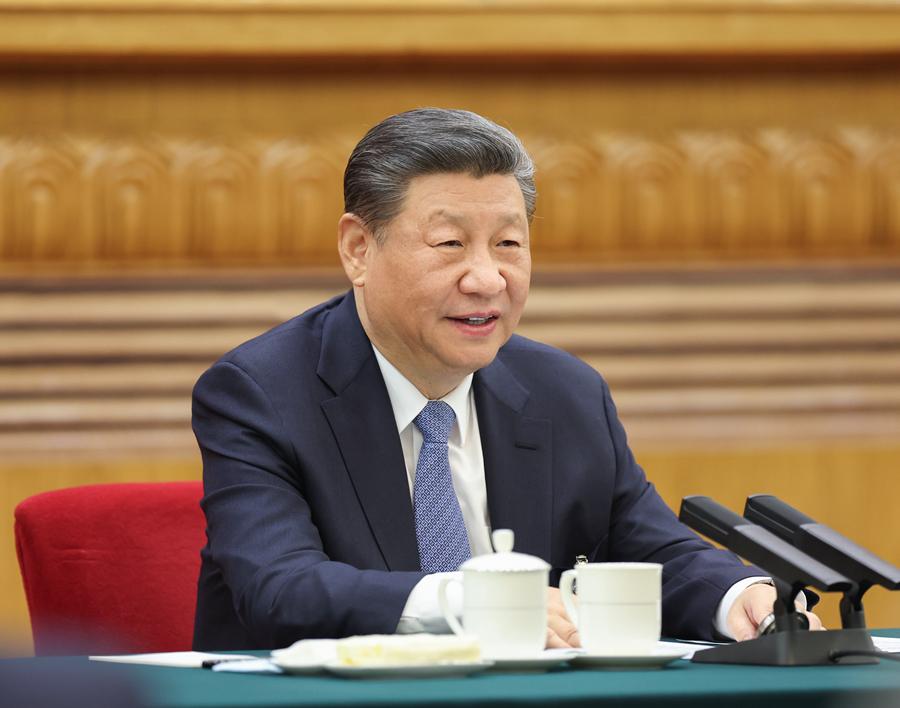
3月5日,中共中央总书记、国家主席、中央军委主席习近平参加他所在的十四届全国人大二次会议江苏代表团审议。新华社记者 鞠鹏 摄
新华社北京3月5日电 中共中央总书记、国家主席、中央军委主席习近平5日下午在参加他所在的十四届全国人大二次会议江苏代表团审议时强调,要牢牢把握高质量发展这个首要任务,因地制宜发展新质生产力。面对新一轮科技革命和产业变革,我们必须抢抓机遇,加大创新力度,培育壮大新兴产业,超前布局建设未来产业,完善现代化产业体系。发展新质生产力不是忽视、放弃传统产业,要防止一哄而上、泡沫化,也不要搞一种模式。各地要坚持从实际出发,先立后破、因地制宜、分类指导,根据本地的资源禀赋、产业基础、科研条件等,有选择地推动新产业、新模式、新动能发展,用新技术改造提升传统产业,积极促进产业高端化、智能化、绿色化。
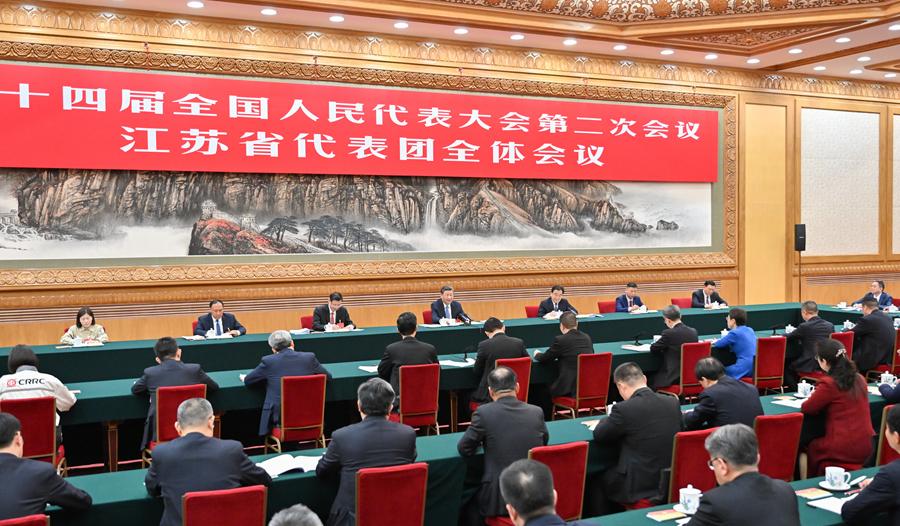
3月5日,中共中央总书记、国家主席、中央军委主席习近平参加他所在的十四届全国人大二次会议江苏代表团审议。新华社记者 岳月伟 摄
江苏代表团审议热烈,气氛活跃。崔铁军、高纪凡、宋燕、吴惠芳、吴新明、孙景南等6位代表分别就实现高水平科技自立自强、推动中国光伏行业高质量发展、加强文化遗产保护传承、建设共同富裕的幸福村、服务长三角一体化发展、弘扬工匠精神等问题发言。习近平不时插话,同大家交流。
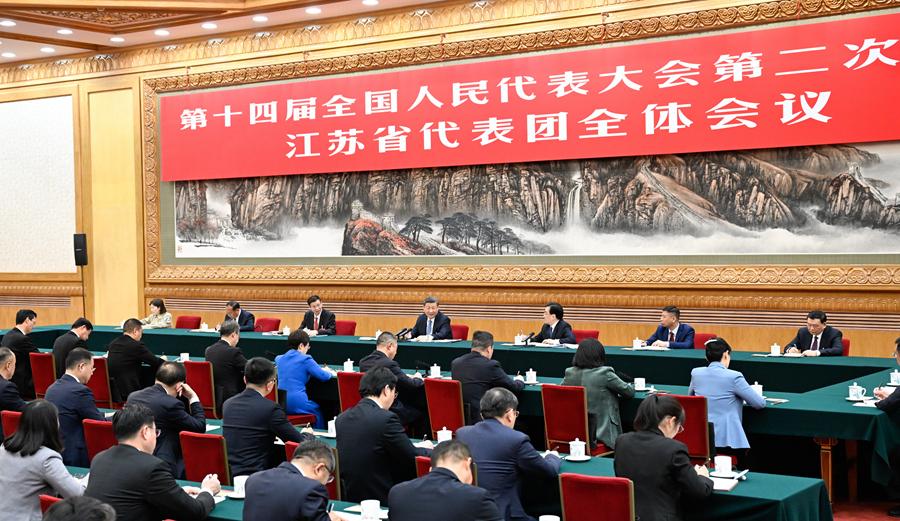
3月5日,中共中央总书记、国家主席、中央军委主席习近平参加他所在的十四届全国人大二次会议江苏代表团审议。新华社记者 谢环驰 摄
在认真听取大家发言后,习近平作了发言。他首先表示赞成政府工作报告,充分肯定江苏经济社会发展取得的新进展新成效,希望江苏坚定信心、鼓足干劲、勇挑大梁,为全国大局作出更大贡献。
习近平强调,江苏发展新质生产力具备良好的条件和能力。要突出构建以先进制造业为骨干的现代化产业体系这个重点,以科技创新为引领,统筹推进传统产业升级、新兴产业壮大、未来产业培育,加强科技创新和产业创新深度融合,巩固传统产业领先地位,加快打造具有国际竞争力的战略性新兴产业集群,使江苏成为发展新质生产力的重要阵地。
习近平指出,要谋划进一步全面深化改革重大举措,为推动高质量发展、推进中国式现代化持续注入强劲动力。围绕构建高水平社会主义市场经济体制,加快完善产权保护、市场准入、公平竞争、社会信用等市场经济基础制度。完善落实“两个毫不动摇”的体制机制,支持民营经济和民营企业发展壮大,激发各类经营主体的内生动力和创新活力。深化科技体制、教育体制、人才体制等改革,打通束缚新质生产力发展的堵点卡点。持续建设市场化、法治化、国际化一流营商环境,塑造更高水平开放型经济新优势。
习近平强调,党的十八大以来,我们实施了一系列区域协调发展战略、区域重大战略、主体功能区战略等,为构建新发展格局、推动高质量发展发挥了重要支撑作用。江苏要全面融入和服务长江经济带发展和长三角一体化发展战略,加强同其他区域发展战略和区域重大战略的对接,在更大范围内联动构建创新链、产业链、供应链,更好发挥经济大省对区域乃至全国发展的辐射带动力。
习近平指出,要继续巩固和增强经济回升向好态势,提振全社会发展信心,党员干部首先要坚定信心、真抓实干。要巩固拓展主题教育成果,建立长效机制,坚决纠治形式主义、官僚主义,切实为基层减负,激发全党全社会创造活力,提振党员干部干事创业的精气神。要坚持以人民为中心的发展思想,在发展中稳步提升民生保障水平,引导激励广大群众依靠自己的双手创造幸福生活。
习近平最后强调,要抓好安全生产,进一步做好安全隐患排查,强化预警监测,落实应急措施,保障人民群众生命财产安全。
中共中央政治局常委、中央办公厅主任蔡奇参加。
穆虹、姜信治等参加。
Xi stresses developing new quality productive forces
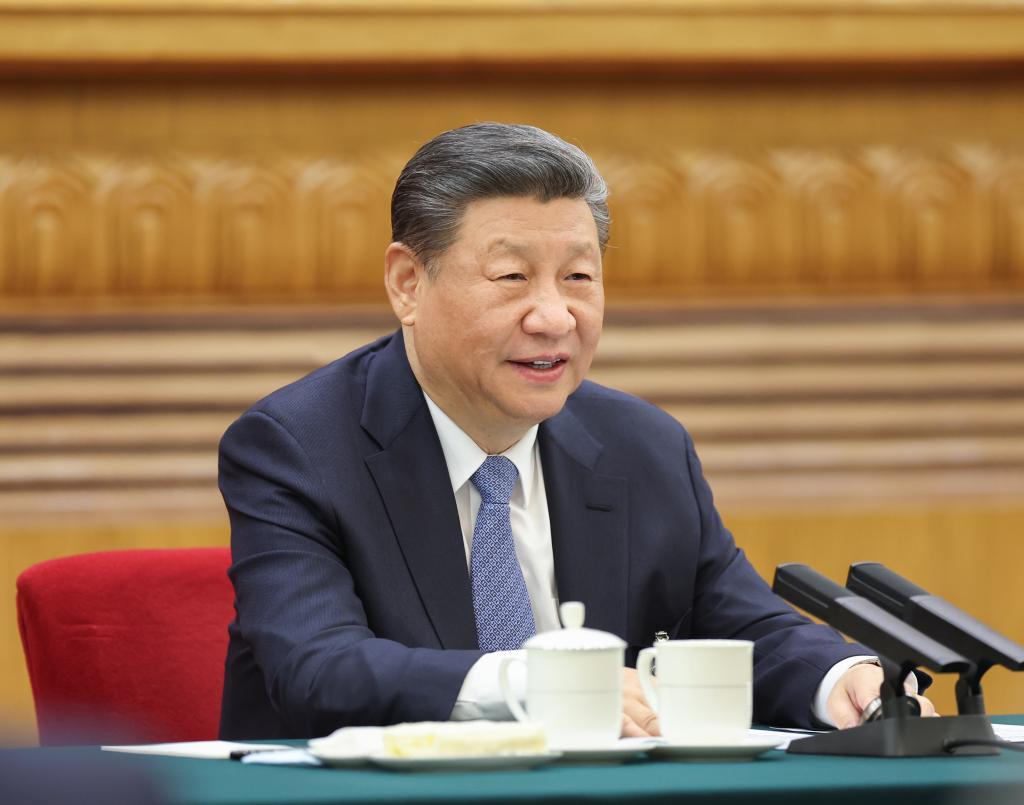
Chinese President Xi Jinping, also general secretary of the Communist Party of China Central Committee and chairman of the Central Military Commission, takes part in a deliberation with his fellow deputies from the delegation of Jiangsu Province at the second session of the 14th National People's Congress (NPC) in Beijing, capital of China, March 5, 2024. (Xinhua/Ju Peng)
BEIJING, March 5 (Xinhua) -- President Xi Jinping on Tuesday stressed developing new quality productive forces according to local conditions during the second session of the 14th National People's Congress, China's national legislature.
Xi, also general secretary of the Communist Party of China (CPC) Central Committee and chairman of the Central Military Commission, made the remarks when he participated in a deliberation with fellow lawmakers from east China's Jiangsu Province.
Xi called for focusing on high-quality development as the top priority, urging efforts to step up innovation, foster emerging industries, adopt forward-thinking plans for developing future-oriented industries and improve the modernized industrial system.
Developing new quality productive forces does not mean neglecting or abandoning traditional industries, Xi said. It is necessary to prevent a headlong rush into projects and the formation of industry bubbles, and avoid adopting just a single model of development, he noted.
Localities should take into account their own resource endowment, industrial foundation and scientific research conditions in promoting the development of new industries, models and growth drivers in a selective manner, and use new technologies to transform and upgrade traditional sectors into high-end, intelligent and green industries, he said.
Xi expressed approval of the government work report and praised the new progress Jiangsu has made in economic and social development, encouraging the province to firm up confidence and go all out to make greater contributions to the overall national development.
To develop new quality productive forces, Jiangsu must focus on the development of a modernized industrial system with advanced manufacturing as the backbone, and speed up efforts to forge clusters of strategic emerging industries with international competitiveness, Xi said.
He urged turning the province into an important front for the development of new quality productive forces.
Xi called for planning major moves to further comprehensively deepen reform to inject strong impetus into promoting high-quality development and Chinese modernization.
It is necessary to accelerate the improvement of underlying institutions in areas such as property rights protection, market access, fair competition and social credit to build a high-standard socialist market economy system, he said.
Work must be done to support the growth of the private sector and private enterprises and spur the intrinsic impetus and innovative vigor of various business entities, Xi noted.
He also stressed deepening reforms in sci-tech, education and talent management systems to remove the bottlenecks and obstacles to the development of new quality productive forces.
It is also important to foster a world-class business environment that is market-oriented, law-based and internationalized, and create new strengths of a higher-standard open economy, he said.
Xi called on Jiangsu to fully integrate into and contribute to the development of the Yangtze Economic Belt and the integrated development of the Yangtze River Delta, and strengthen synergy with other regional development strategies and major regional strategies.
Urging Jiangsu to build larger-scale innovation chains, industrial chains, and supply chains, Xi instructed the province to leverage its status as an economically developed province to drive and influence both regional and national development.
Xi also called for continued efforts to consolidate and strengthen the momentum of economic recovery to boost confidence in development across society.
He urged resolute measures to rectify pointless formalities and bureaucratic practices. Practical steps should be taken to ease the burdens on those working on the ground, and stimulate creativity within the entire Party and society.
Xi also emphasized steady efforts to enhance people's well-being amid development and ensure workplace safety.
Cai Qi, a member of the Standing Committee of the Political Bureau of the CPC Central Committee and director of the General Office of the CPC Central Committee, participated in the deliberation.
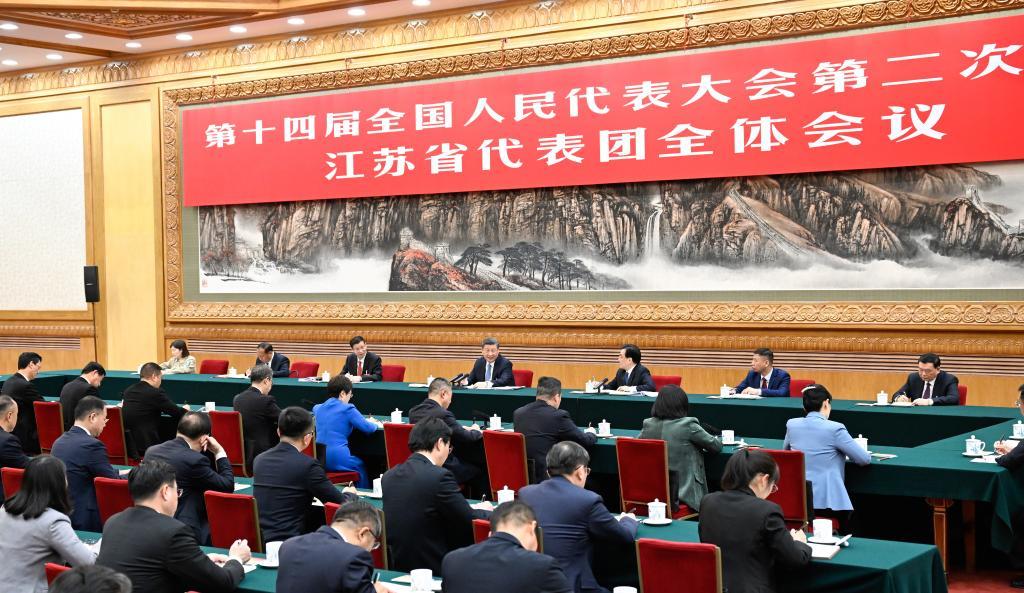
Chinese President Xi Jinping, also general secretary of the Communist Party of China Central Committee and chairman of the Central Military Commission, takes part in a deliberation with his fellow deputies from the delegation of Jiangsu Province at the second session of the 14th National People's Congress (NPC) in Beijing, capital of China, March 5, 2024. (Xinhua/Xie Huanchi)
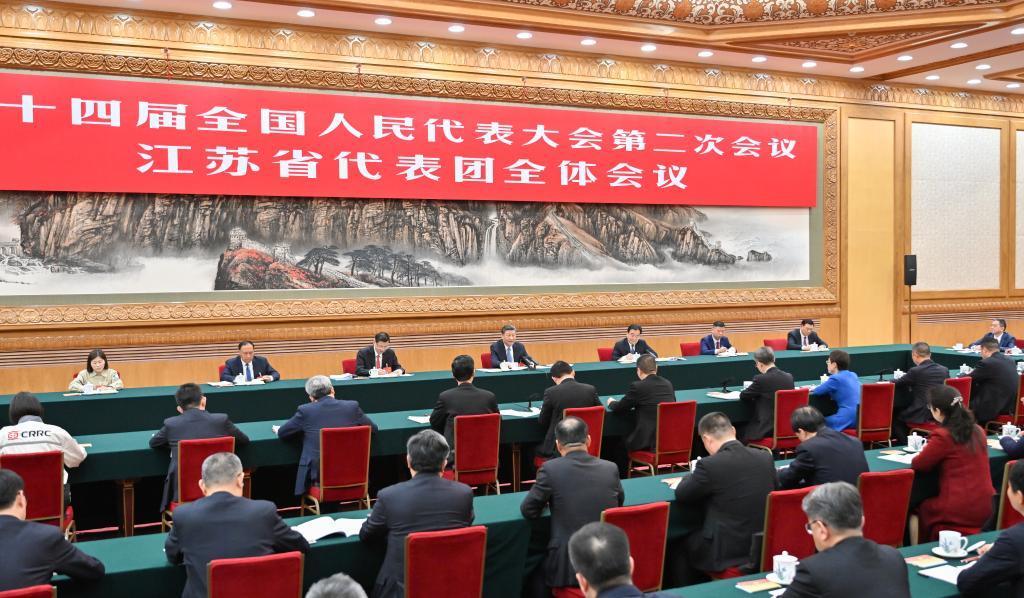
Chinese President Xi Jinping, also general secretary of the Communist Party of China Central Committee and chairman of the Central Military Commission, takes part in a deliberation with his fellow deputies from the delegation of Jiangsu Province at the second session of the 14th National People's Congress (NPC) in Beijing, capital of China, March 5, 2024. (Xinhua/Yue Yuewei)

